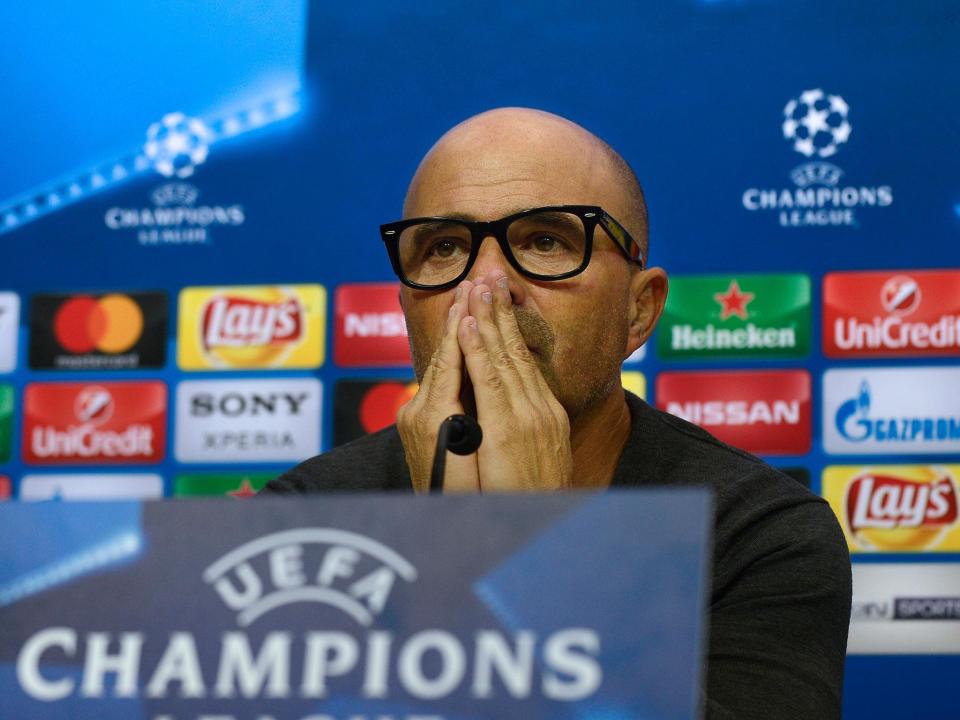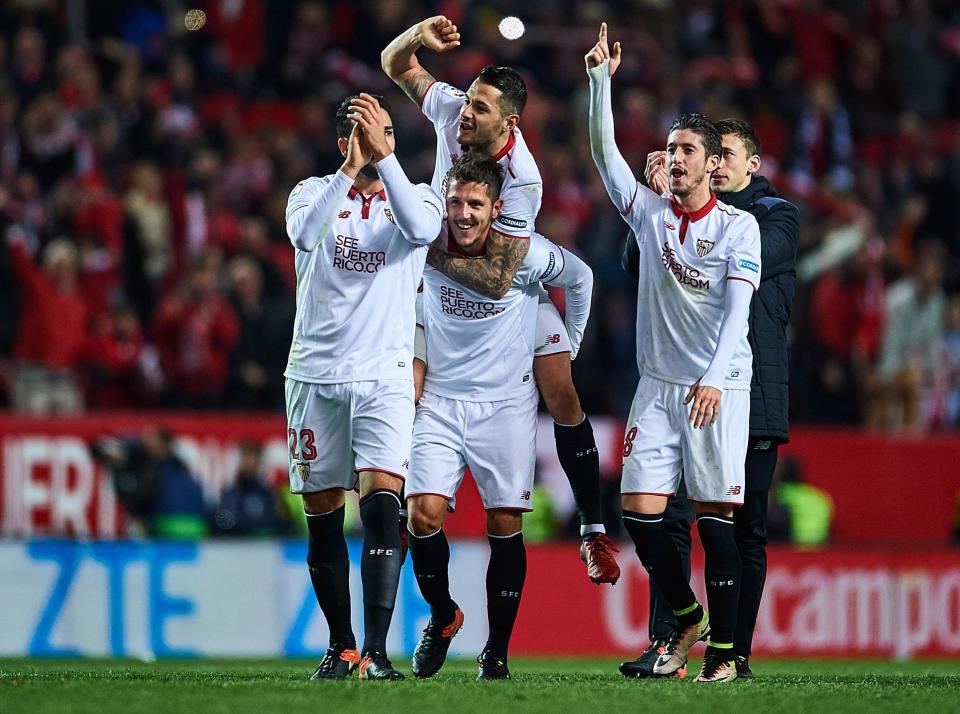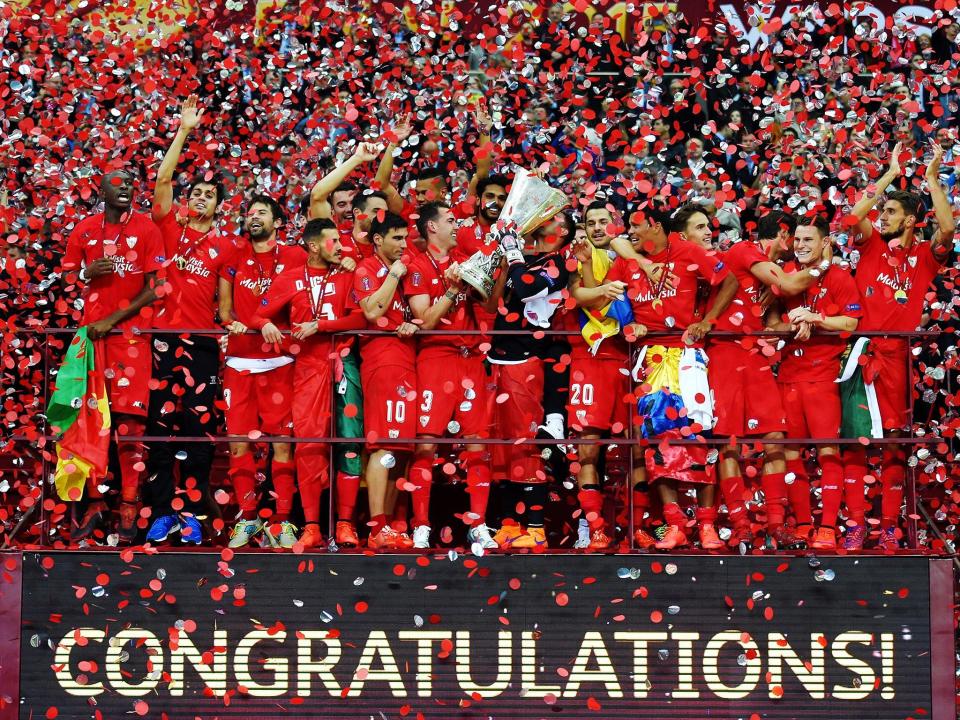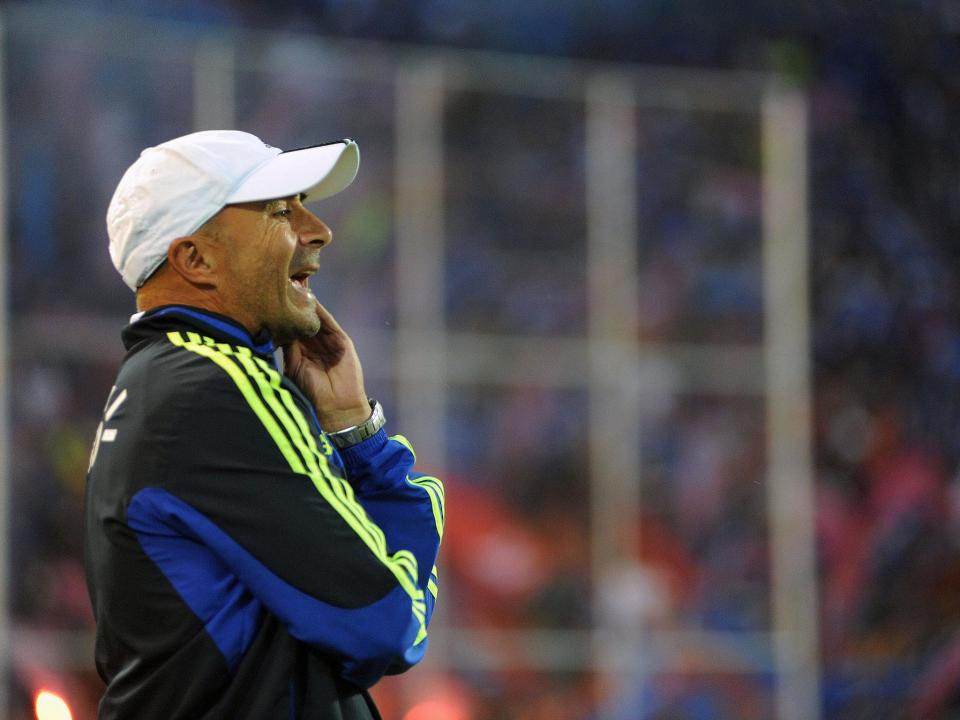Jorge Sampaoli the looming figure standing in Leicester's way and on his own collision course with Barcelona

It genuinely remains one of the finest pieces of alchemy in South American football history, and has set up Jorge Sampaoli’s very bright future. It also came from the type of deep introspection and innovation that has defined the Argentine’s career, and why Leicester City should be even more worried for Wednesday night’s Champions League trip to Sevilla.
Because, in the build-up to the 2015 Copa America final in Santiago, the then Chile manager had a problem to figure out, one he was initially struggling with. Sampaoli had to find a way of stopping a Lionel Messi that was then in career form following his second treble with Barcelona, but knew that he needed to do so while maintaining the host nation’s naturally attacking game - or else they would ultimately be overwhelmed by Argentina.
This challenge was only heightened by the pressure of the fact he was facing his home country and Chile had never won any silverware at all, but now finally had the chance in their own stadium. The nation held its breath. Sampoli, though, more than held his nerve.
Those close to the manager say he watched every Argentina Copa America match “at least 20 times” in the days before the final. It sounds like the kind of overwhelming amount of information that can cause the “paralysis by analysis” coaches often talk about, but not for Sampaoli. He gradually figured out what he could do, and started to see the patterns on the pitch that would be beyond most people watching the same thing. Sampaoli began to imagine how he could impose Chile’s system on Argentina, until those ideas became reality.
On the day, Messi always found himself surrounded by three players - primarily Charles Aranguiz - to the point he and Argentina were unusually subdued, always fearful of how Chile could suddenly spring into attack. The game went to extra-time and penalties, until Alexis Sanchez deftly lifted the final spot-kick over the line for Sampaoli’s team to lift the cup.
This is the challenge facing Leicester at the Sanchez Pizjuan on Wednesday. Claudio Ranieri does not just have to figure out how to get the free-falling English champions back onto something like their best form again in order to salvage this season. He also has to figure out how to out-think one of the best managers in the world right now, potentially the next best manager on his own and maybe even the next manager of Barcelona.
That remains to be seen, but it would continue the sharp upward trajectory of the Argentine’s recent career. As with so many of his previous jobs, Sampaoli’s impact on Sevilla has been instant and so aesthetically impressive.
The regular Europa League winners have at last made a Champions League breakthrough, finally qualifying for the last 16, and have suggested they could break the usual order in Spain. Sampaoli’s Sevilla were the team to finally beat the supposedly unbeatable Real Madrid, ending the league leader’s 40-game run without a defeat in January, and are currently second in La Liga ahead of both Barcelona and Atletico Madrid.

It is little wonder the Catalans see him as one of the two main candidates to be their next manager, along with Athletic Bilbao’s Ernesto Valverde, potentially in the summer if Luis Enrique goes. The Barcelona board view Sampaoli in that way because of how his football fits their philosophical ideals, how his proactive pressing-possession game follows the line of Marcelo Bielsa and Pep Guardiola.
All of that is true, and there are unmistakeable influences and similarities, but Sampaoli’s career is hugely distinctive in its own right.
Those who have worked with Sampaoli say this meticulous intensity has always characterised him, but that it is never malicious or hard-edged
For one, despite the seemingly permanent baseball cap atop a youthful face and hugely energetic body, he is already 56. That is older than pretty much all of the managers considered the best in the world right now, including one of the longest-serving like Jose Mourinho.
Ascending to the Barcelona job or any of the other major roles at such an age would be out of step with the careers of such contemporaries in the modern game, but then that’s always been the case for Sampaoli. There should be no fear of him being caught out of step by the trends of that modern game, or rising to such a role too late. Sampaoli’s unique vision means everything about his football still seems so fresh.
Neither a former professional like Guardiola or Mauricio Pochettino, nor the newer breed of a learned technician like Mourinho, the Argentine has had a bit of everything in a circuitous route here. The Santa Fe-born football obsessive had been a youth player at Bielsa’s old club, Newell’s Old Boys, only to be forced out of the game at just 19, due to a complex injury to his tibia and fibula.

Sampaoli then worked mainly as a bank cashier in his home town of Casilda while keeping up amateur coaching, eventually taking over at Alumni de Casilda. He earned wider exposure and eventually a move to Argentino de Rosario when a picture was published of the manager barking instructions from a tree overlooking their pitch, having been expelled from the bench.
Those who have worked with Sampaoli say this meticulous intensity has always characterised him, but that it is never malicious or hard-edged. Players enjoy working with him. It is said the Sevilla squad expected to be berated on losing one of his first games, the European Super Cup, to a last-minute Real Madrid winner - but that it never came. Instead, Sampaoli had forensically noted the mistakes that led to it, and got his team to learn from it. The results could be seen when they turned that on Real in January, winning the game late on.

Another constant of Sampaoli’s career has been that ingrained Bielsa-inspired pressing-possession style, even if it has obviously evolved over time. A common refrain within the Chilean national team was that they could play it “with their eyes closed”, so deeply had the Argentine got the players to understand it. The same blueprint can be seen right through his sides, from Juan Aurich and Coronel Bolognesi in Peru through to Emelec in Ecuador and Universidad de Chile.
That list alone shows how meandering Sampaoli’s career was for quite a while, affected by everything from resources to temporary misfortune. All of his sides, however, showed progress and proactively exciting football. That ensured the course of that career was bound to drastically change at some point, as finally happened at Emelec. Having impressed in the Copa Libertadores, he was coaxed to Universidad de Chile, who had been impressed with his O’Higgins team that made life so difficult for them in 2007.
Sampaoli made Universidad repeat league winners and one of the most feared teams on the continent, eventually claiming the 2011 Copa Sudamericana - the equivalent of the Europa League. That also made him the obvious successor to Bielsa with the Chilean national team in 2011, but he did more than just continue the work. He took it on, improved on it, improved the team.

Whereas Bielsa had always been somewhat distant with the players, Sampaoli looked to connect with them, fully realising the deeper commitment that could bring and the effect it could have on their already full-blooded football. It turned a willing team into a winning team, adding exhilaration to the excitement.
This is the other aspect to his career. For all his intensity and intricate planning, it is built on an intrinsic joy, and a desire for players to ultimately express themselves.
“I believe that the only way to succeed is by uniting players with a love of playing,” Sampaoli has said. “You try to inspire in them a love of the shirt derived of enjoyment, not obligation.”
The end product is that his teams radiate this. They are exacting and hard-working, but also so exuberant. That’s the stand-out trait of his sides: the excitement of all. Their games are full of life.
And, just like Chile, Sevilla are so clearly enjoying themselves right now. It should mean Leicester won’t enjoy playing against them.
Any club, however, would greatly enjoy Sampaoli as manager. It is something for Barcelona, and many Premier League clubs like Arsenal, to think deeply on.

